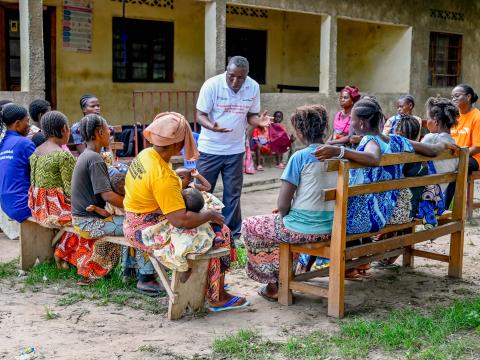DR Congo: Malnutrition At The Heart Of Households: The Urgency Of Nutritional Dialogue

By Tatiana Ballay, Communications Officer
A nutritional dialogue held on December 16, 2025, in the Nyemba health zone, 15 kilometers from Kalemie in Tanganyika province, brought together community members to address malnutrition. This scourge still affects nearly 45 million children worldwide. This event was part of World Vision's ENOUGH campaign, aimed at raising awareness and mobilizing families around nutritional issues and solutions to protect children. Participants described malnutrition as a deficiency of nutrients and an insufficient amount of food. They emphasized that malnutrition results from a lack of food but also of poor eating practices, and a lack of nutritional knowledge. Women highlighted the importance of meal quality, while men pointed out visible signs of malnutrition, such as weight loss and swelling.
According to Marie, a participant in the dialogue:
"When a child is malnourished, the whole future of a family is at risk. Malnutrition is not just a problem of poverty, it is a lack of knowledge."
Root causes: Poverty, ignorance, and risky behaviors
Poverty remains the primary cause of malnutrition, with families only able to afford one meal per day. However, participants also mentioned risky behaviors, such as spending money on alcohol or tobacco instead of investing it in their children's nutrition. Some stressed that even with limited resources, it is possible to improve eating habits through better cooking practices and more effective management of family resources.
Impact of the nutritional dialogue: A collective awareness
The nutritional dialogue enabled participants to understand better the importance of their role in combating malnutrition. Many expressed a desire to change their practices, committing to better meal planning, such as Wivine, who learned how to preserve nutrients while cooking.
"I didn’t know that some of my cooking habits were causing important nutrients to be lost in the meals. Thanks to this session, I feel better equipped to protect my children," she said.
These exchanges had a transformative effect, strengthening parents' motivation to improve their diets and share their knowledge.
The ENOUGH Campaign: A lever for a better future
World Vision’s ENOUGH campaign focuses on nutritional education, support for local agricultural development, and promotion of access to healthcare for vulnerable children. In the Democratic Republic of Congo, early results are encouraging, with hundreds of parents trained in foodment. These locally resource managedriven actions aim to create lasting change for communities.
Recommendations to Combat Malnutrition
Participants proposed several solutions, including strengthening local agriculture, expanding arable land, and preserving harvests to ensure sustainable food sources. They also emphasized the need to educate parents on the nutritional value of food and meal preparation methods. Joint financial management within households was also recommended to better meet children’s nutritional needs.
A call to action
Participants stressed the importance of multiplying these dialogues and encouraging collective action among communities, local authorities, and partners. The goal is to build a future where no child suffers from hunger or malnutrition. As Marie expressed, "These sessions must be repeated for lasting change."
Malnutrition, though a silent epidemic, can be defeated. Nutritional dialogue is a powerful tool for raising awareness and educating communities. It is crucial to continue supporting the ENOUGH campaign and intensify these actions to ensure a future free from malnutrition. As Matondo pointed out, "We must act now, not tomorrow."